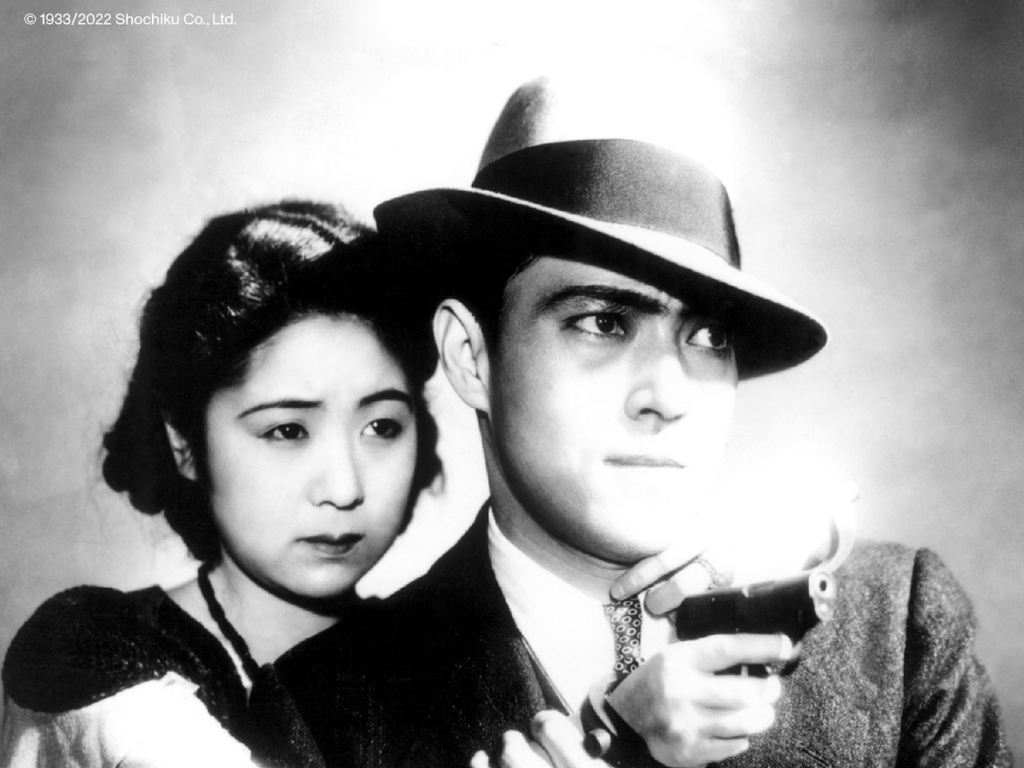
DRAGNET GIRL (HIJOSEN NO ONNA) (director/writer: Yasujiro Ozu; screenwriter: Ikeda Tadao; cinematographer: Hideo Shigehara; editors: Kazuo Ishikawa/Minoru Kuribayashi; cast: Kinuyo Tanaka (Tokiko), Joji Oka (Jyoji), Sumiko Mizukubo (Kazuko), Hideo Mitsui (Hiroshi), Yumeko Oushi (Misako), Yoshio Takayama (Senko), Koji Kaga (Misawa), Yasuo Nanjo (Okazki, the president’s son), Chishu Ryu (policeman); Runtime: 100; MPAA Rating: NR; Panorama; 1933-silent-Japan-in Japanese with English subtitles)
“This was the only film Ozu made that had a gunshot.“
Reviewed by Dennis Schwartz
Acclaimed Japanese filmmaker Yasujiro Ozu (“A Hen in the Wind”/”Walk Cheerfully”/”Early Summer”)directs and cowrites with Ikeda Tadaothis shot in B/W American-like silent gangster film noir.The film’s star,Kinuyo Tanaka, later became Japan’s first woman director.Noted for his family dramas, this was the only film Ozu made that had a gunshot.Dragnet Girl has little to say about crime that is meaningful and its story of a woman trying to reform her thuggish man is hardly fresh, but it’s stylish (tracking shots and sweeping chiaroscuro) and looks much like Josef von Sternberg’s 1927 German expressionist film Underworld.
Tokiko (Kinuyo Tanaka) has a day job as a typist for a business firm, and the boss’s nice son (Yasuo Nanjo) flirts with her but she resists. At night Tokiko lives like a vamp with ex-boxer and small-time gang leader boyfriend Joji (Joji Oka), someone she dearly loves and supports financially. High school student Hiroshi(Hideo Mitsui), who trains for boxing in the same gym that Joji hangs out in, joins Joji’s gang. As a result, his hard-working record store clerk older sister, Misako (Yumeko Oushi), objects and tells Joji to talk her mixed-up brother out of joining the gang. The attractiveMisako Tokiko becomes jealous of the attention Joji pays to the attractive innocent girl, but decides against harming Misako because she takes a liking to her.
The concluding scenes have Tokiko convincing Joji to go straight. Joji agrees, but tells her they must commit one last job and then move from Yokohama and start over. The duo pull guns and rob her boss in the busy office during the work day. The noble Joji commits the robbery so that Hiroshi can pay back the money he robbed from his sister’s cash register, thereby saving him from a life of crime.
While running from the police, Tokiko begs Joji to surrender with her to the police and after only a few years in jail can get a fresh start. When Joji leaves her, Tokiko shoots him and he has a superficial wound. He now agrees to her demand and the two embrace as they’re captured.
It’s an appealing film that follows the American gangster conventions. It’s worth seeing as proof that Ozu could have made top-notch gangster films if he so desired.
REVIEWED ON 9/16/2010 GRADE: B+
© ALL RIGHTS RESERVED DENNIS SCHWARTZ